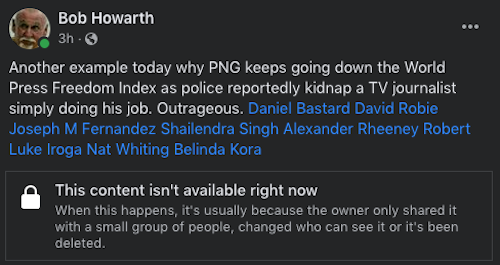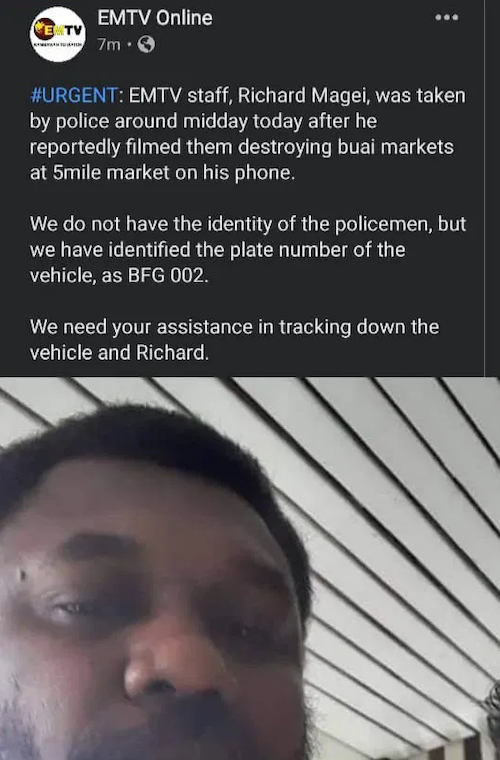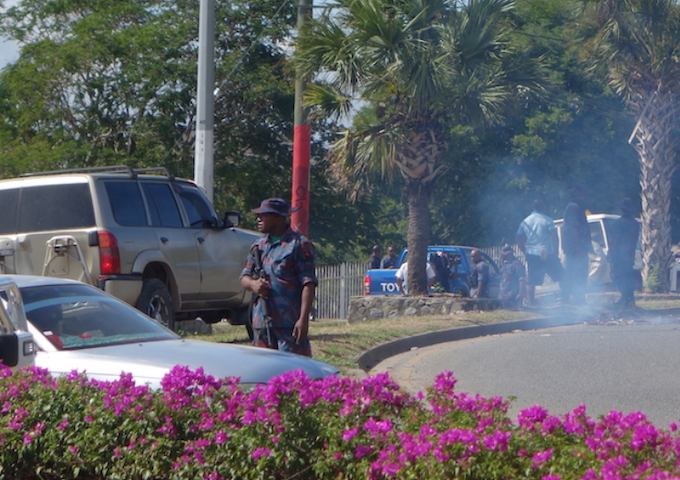Pacific Media Watch newsdesk
Papua New Guinean police have released a detained EMTV staff man, Richard Magei, after he reportedly filmed officers destroying buai markets at 5 Mile in the capital of Port Moresby.
An appeal by the television channel for more information was posted on the network’s Facebook page, saying Magei, a sales executive, “was taken by police around midday today after he reportedly filmed them destroying buai markets at 5mile market on his phone”.
It added: “We need your assistance in tracking down the vehicle [number given on the posting] and Richard.”
The television station’s management later removed the Facebook posting apparently while negotiations for Magei’s release were under way. But the incident came as an independent development blog in Australia today accused the PNG police of “rogue brutality” over several incidents.
Police Minister Bryan Kramer posted on the EMTV News Facebook page this message: “I’ve raised [the Magei] issue with ACP [Assistant Commissioner of Police] for NCD [National Capital Distriict] for Wagambie Jnr and he responded [that he had] asked Met Sup to look into it.”
The Minister for Communications and Information Technology, Timothy Masiu, appealed for Magei’s release, calling for “common sense to prevail”, the PNG Bulletin reports.
“I wish for Mr Magei’s unconditional release if he is indeed being held by police,” Minister Masiu said in a statement.
A senior EMTV news executive later confirmed that Magei had been released without charge.
The chewing of betel nut, the seed of the Areca palm known as “buai” in PNG, is common across parts of Asia and the Pacific. It is a strong tradition in PNG but some authorities have been trying to suppress the custom.
Police brutality a concern for PNG
“The use of force by police and police brutality continue to be a concern to the people of Papua New Guinea,” wrote Terence Kaidadaya and Okole Midelit today in the blog of the Development Policy Centre at the Australian National University’s College of Asia and the Pacific.
“Police brutality is only perpetrated by a minority of ill-disciplined rogue police officers and does not reflect the mindset of the Royal PNG Constabulary (RPNGC) in its entirety, but it certainly gives the constabulary a bad reputation,” the blog posting said.
“It creates distrust of the police by citizens and reflects badly on the PNG government.”

Kaidadaya is a foreign affairs officer with the Papua New Guinea Foreign Affairs Department and Midelit is a teaching fellow with the political science department at the University of Papua New Guinea.
The blog cited two examples out of many over the past few years – one from last month and one from 2016 – to illustrate the fact that alleged police brutality often stemmed from political influence in policing:
-

The original EMTV appeal on Facebook. Image: APR screenshot “On 18 April 2021, a few police officers attached to the Fox Unit in Port Moresby allegedly forcefully entered [lawyer Laken] Aigilo’s residence at night and assaulted him, and later kidnapped and threatened to kill him before detaining him at the Boroko Police Station. As Mr Aigilo has indicated, this was done without any prior formal complaint lodged against him, and without an arrest or search warrant. He was released the next day after instructions were issued by PNG Police Commissioner David Manning.
- “A practising lawyer, Mr Aigilo alleges that the police attack raises the question of whether or not police acted impartially or in support of Enga Governor Sir Peter Ipatas against him. This is because Mr Aigilo’s alleged assault and detainment came a day after he formally lodged a complaint with the PNG Ombudsman Commission against Sir Peter over allegations relating to financial mismanagement of the Porgera mine landowners’ royalty payments totalling up to K1.6 billion over a 30-year period.”
- “In 2016, students at the University of Papua New Guinea led nationwide protests against Prime Minister Peter O’Neill. Their grievances were many but centred on accountability and the lack of execution of a long-standing corruption charge and arrest warrant against the prime minister.
- “To quell the protest, armoured police officers went to UPNG and opened fire on unarmed university protesters, [shooting four dead and wounding 13]. The action was viewed by the public as politically motivated in order to protect politicians.”
Appropriate discipline needed
Kaidadaya and Midelit wrote in their blog that “appropriate disciplinary action needs to be taken against officers who either violate their constitutional roles or take sides when it comes to political interests”.
“Most importantly, politicians need to stop interacting with the police, and stop using them for political reasons,” the authors said. “Perhaps then, trust in, and the credibility of, the RPNGC could be restored.”

Article by AsiaPacificReport.nz





